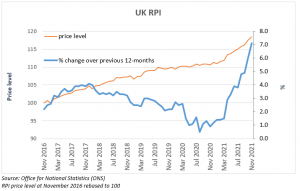UK inflation in November continued to print at elevated levels. The Office for National Statistics (ONS) figures show the annual rate of increase of the Consumer Prices Index (CPI) rising from 4.2% in October to 5.1% in November. The Retail Prices Index (RPI) has risen to its highest level for more than 30 years, rising from an annual rate of 6.0% in October to 7.1% in November. The Bank of England has increased the base rate from 0.1% to 0.25% after the Monetary Policy Committee voted for a rate rise to combat rising inflation levels.
The chart below shows the RPI price level over the past five years and the % change in RPI over the proceeding 12-months.
The Bank of England expects CPI inflation to be around 5% in the spring of next year and after that it expects inflation to fall. It expects the impact of higher oil and gas prices will fade and the demand for goods and services will not continue to rise as fast as current levels.
Inflation hedging for DB schemes
DB pension schemes that have not recently reviewed their inflation hedging policies should do so now. Given the increases in expected and actual inflation levels over the past 1-year, it is likely some schemes will have inflation hedging levels that have drifted from their target levels. Over or under hedging increases the risk of funding level changes in response to changes in inflation expectations.
Schemes that do not have an inflation hedging policy should consider putting one in place. Investing in liability-driven investment funds and/or index-linked gilt funds are common ways for schemes to access inflation hedging strategies.






